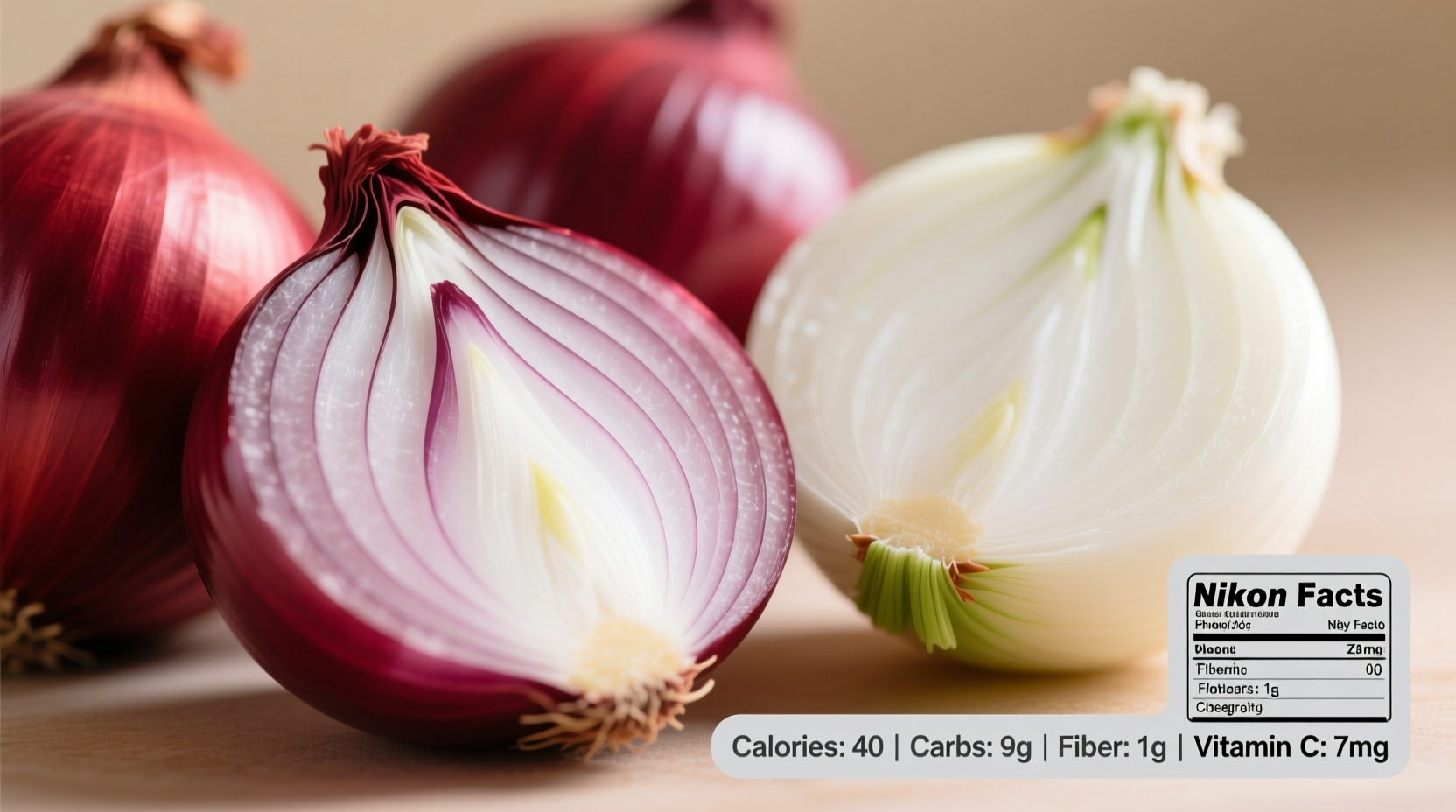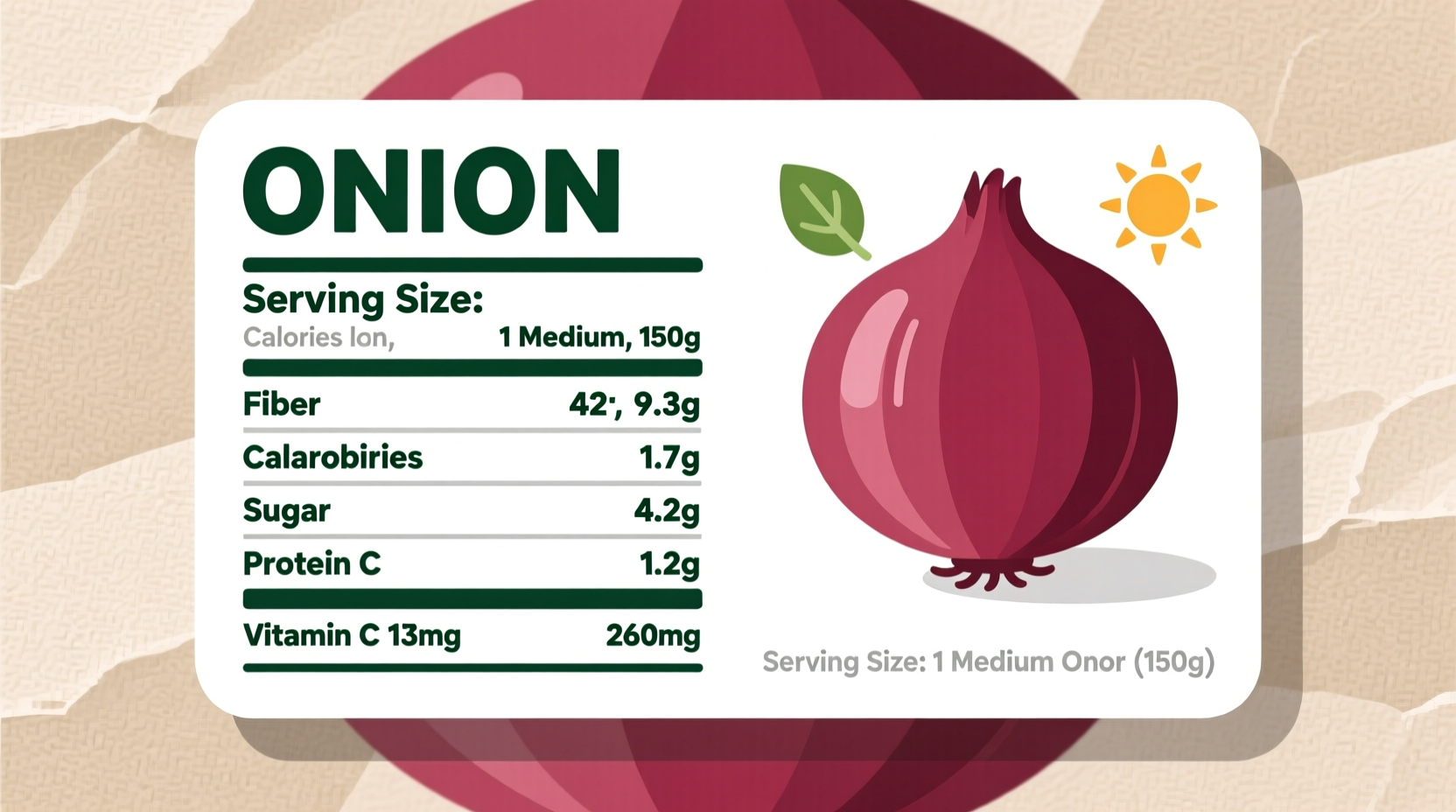One medium raw onion (110g) contains just 44 calories, 10g of carbohydrates, 1.9g of fiber, and delivers 20% of your daily vitamin C needs. Onions are rich in quercetin (a powerful antioxidant), sulfur compounds, and provide notable amounts of B vitamins and potassium. Unlike packaged foods, fresh produce like onions doesn't carry commercial nutrition labels, but standardized USDA data reveals their impressive nutritional profile.
Ever wondered what an onion nutrition label would actually say if it came with one? While fresh produce doesn't feature mandatory nutrition labels like packaged goods, understanding the nutritional composition of this kitchen staple is essential for making informed dietary choices. Onions pack a surprising nutritional punch despite their low-calorie count, offering compounds that support heart health, reduce inflammation, and may even help regulate blood sugar.
Decoding Onion Nutrition: What the Data Reveals
Unlike processed foods with standardized nutrition facts panels, fresh onions rely on USDA's comprehensive food composition database for accurate nutritional information. The following table presents the complete nutritional profile for a medium raw onion (110g), the serving size most relevant to everyday cooking:
| Nutrient | Amount per 110g (Medium Onion) | % Daily Value* |
|---|---|---|
| Calories | 44 | 2% |
| Total Fat | 0.1g | 0% |
| Sodium | 4mg | 0% |
| Total Carbohydrate | 10.3g | 4% |
| Dietary Fiber | 1.9g | 7% |
| Sugars | 5.0g | |
| Protein | 1.2g | 2% |
| Vitamin C | 7.4mg | 12% |
| Vitamin B6 | 0.1mg | 6% |
| Folate | 19mcg | 5% |
| Potassium | 167mg | 4% |
| Manganese | 0.1mg | 6% |
*Percent Daily Values based on a 2,000 calorie diet. Source: USDA FoodData Central, ID 11282

Why Onions Don't Have Commercial Nutrition Labels
Fresh produce like onions operates under different labeling regulations than packaged foods. The FDA's Nutrition Facts Label requirements primarily apply to processed and packaged items. However, the USDA maintains the definitive database for raw food nutrition through their FoodData Central system, which scientists and nutrition professionals rely on for accurate information.
Understanding Serving Sizes in Real Cooking Contexts
When following recipes or tracking nutrition, understanding actual serving sizes matters. Here's how onion measurements translate to nutritional content:
- 1 cup chopped raw onion (160g): 64 calories, 15g carbohydrates, 2.7g fiber
- 1 small onion (50g): 20 calories, 4.7g carbohydrates, 0.9g fiber
- 1 large onion (150g): 60 calories, 14g carbohydrates, 2.7g fiber
These measurements help you accurately track nutrition whether you're meal prepping, managing carbohydrate intake, or following specific dietary protocols. The fiber content in onions (nearly 2g per medium onion) contributes significantly to digestive health and helps moderate blood sugar response to carbohydrates in your meal.
How Preparation Methods Affect Onion Nutrition
The way you prepare onions dramatically impacts their nutritional profile. Understanding these context boundaries helps maximize health benefits:
- Raw onions preserve maximum vitamin C and quercetin content
- Sautéed onions (medium heat, 5 minutes) retain about 80% of quercetin but reduce vitamin C by 25%
- Caramelized onions (low heat, 30+ minutes) develop beneficial compounds but reduce overall volume significantly (4 cups raw = 1 cup caramelized)
- Cooked in acidic environments (like tomato sauce) helps preserve anthocyanins in red onions
Research published in the Journal of Nutrition confirms that while some heat-sensitive nutrients decrease with cooking, the bioavailability of certain beneficial compounds actually increases. This nuanced understanding helps you make informed decisions about when to use raw versus cooked onions for maximum health benefits.
Onion Varieties: Nutritional Differences You Should Know
Not all onions offer identical nutritional profiles. Here's how common varieties compare per 100g serving:
- Yellow onions: Highest in quercetin (113mg/100g) - the most common cooking onion
- Red onions: Rich in anthocyanins (providing the purple color) with 22% more antioxidants than yellow varieties
- White onions: Slightly higher in allicin compounds but lower in overall antioxidants
- Shallots: Highest nutrient density with 60% more flavonoids than yellow onions
- Green onions (scallions): Higher vitamin K content (207mcg/100g vs 0.4mcg in bulb onions)
A comprehensive analysis by the USDA Agricultural Research Service demonstrates that red onions consistently show the highest antioxidant capacity among common onion varieties. This matters because antioxidants help combat oxidative stress in the body, potentially reducing risk of chronic diseases.
Practical Applications: Maximizing Onion Nutrition in Your Diet
Knowing the nutrition facts is only valuable when you apply them to real-world eating. Here's how to leverage onion nutrition effectively:
For Blood Sugar Management
The chromium content in onions (0.2mcg per medium onion) works synergistically with the fiber to help regulate insulin response. Pair onions with carbohydrate-rich foods to moderate blood sugar spikes - try adding raw red onions to grain bowls or sandwiches.
For Heart Health Support
Onions contain organosulfur compounds that may help lower blood pressure and reduce cholesterol. For maximum cardiovascular benefits, let chopped raw onions sit for 10 minutes before eating to activate beneficial enzymes, then pair with healthy fats like olive oil to enhance absorption of fat-soluble compounds.
For Digestive Wellness
The inulin fiber in onions (a prebiotic) feeds beneficial gut bacteria. Start with small amounts if you're new to high-fiber foods, and consider cooking onions if raw causes digestive discomfort while still gaining significant prebiotic benefits.
Common Misconceptions About Onion Nutrition
Several myths persist about onion nutrition that deserve clarification:
- "Onions are high in sugar" - While onions contain natural sugars (about 5g per medium onion), they have a low glycemic load of 2, meaning they don't significantly impact blood sugar when consumed in typical serving sizes.
- "Cooking destroys all nutritional value" - While some nutrients decrease with heat, others become more bioavailable. The overall health benefits remain substantial regardless of preparation method.
- "Only the outer layers contain nutrients" - Nutrients are distributed throughout the onion, though the outer layers do contain slightly higher concentrations of certain antioxidants.
How Onions Compare to Other Allium Vegetables
Understanding where onions fit within the allium family helps create balanced meals:
- Garlic contains more allicin (the compound responsible for many health benefits) but onions provide more consistent daily consumption potential due to milder flavor
- Leeks offer higher vitamin K and A content but lower antioxidant concentration than onions
- Chives provide more vitamin K but significantly less of the beneficial quercetin found in bulb onions
For optimal health benefits, incorporate a variety of allium vegetables throughout your week rather than relying on just one type. Each offers a unique nutritional profile that contributes to overall dietary diversity.
Storage Tips to Preserve Onion Nutrition
How you store onions affects their nutrient retention:
- Store whole, unpeeled onions in a cool, dark, well-ventilated place (not the refrigerator)
- Cut onions should be stored in airtight containers in the refrigerator for up to 7 days
- Freezing onions preserves most nutrients for up to 6 months, though texture changes
- Avoid storing onions near potatoes, which emit gases that accelerate spoilage
Proper storage maintains the maximum nutrient content until you're ready to use them in your cooking. The sulfur compounds that give onions their distinctive flavor and many health benefits remain stable through proper storage.
Frequently Asked Questions
How many calories are in a medium onion?
A medium raw onion (approximately 110g) contains 44 calories. This makes onions an excellent low-calorie ingredient that adds significant flavor and nutritional value without substantial caloric impact.
Are onions good for weight loss?
Yes, onions can support weight loss efforts as they're low in calories (44 per medium onion) yet high in fiber (1.9g), which promotes satiety. Their natural sweetness can also reduce the need for added sugars in recipes, and the chromium content may help regulate blood sugar and reduce cravings.
Which onion variety has the most health benefits?
Red onions generally offer the highest antioxidant content, with studies showing they contain up to 22% more antioxidants than yellow onions. They're particularly rich in anthocyanins (the pigments that give them their purple color) and quercetin. However, all onion varieties provide significant health benefits, so incorporating a variety is ideal for maximum nutritional diversity.
Does cooking onions reduce their nutritional value?
Cooking affects different nutrients in various ways. Vitamin C decreases with heat exposure, but the bioavailability of certain beneficial compounds like quercetin actually increases with moderate cooking. Sautéing onions at medium heat for 5 minutes preserves about 80% of quercetin while making other nutrients more accessible. The overall health benefits remain substantial regardless of preparation method.











 浙公网安备
33010002000092号
浙公网安备
33010002000092号 浙B2-20120091-4
浙B2-20120091-4